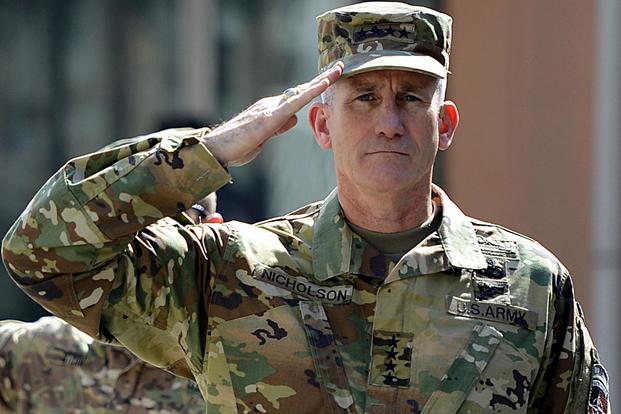President Donald Trump reportedly suggested firing Army Gen. John Nicholson as the U.S. commander in Afghanistan during a confrontational meeting at the Pentagon last month with Defense Secretary Jim Mattis and others.
Mattis and Joint Chiefs Chairman Gen. Joseph Dunford defended Nicholson at the July 19 meeting, which featured a "shouting match" between White House Chief Strategist Steve Bannon and Army Lt. Gen. H.R. McMaster, the White House national security adviser, on the overall strategy for Afghanistan.
The testy meeting, first reported by NBC News and later corroborated by other news outlets, was dominated by Trump's venting of his frustration at the lack of progress in Afghanistan after 16 years of war with no end in sight.
"We are not winning, we are losing," Trump said, according to NBC News.
Related content:
- Holdup on Mattis' Strategy for Afghanistan in White House: Dunford
- Afghan War Stalemated After 15 Years: Top US Commander
- No Decision Yet on Sending More Troops to Afghanistan: White House
The meeting was called to consider a new strategy for Afghanistan and the region that Mattis has been preparing and had tentatively promised to deliver by mid-July.
Since mid-February, Nicholson, commander of U.S. Forces-Afghanistan and the NATO Resolute Support mission, has been lobbying for an additional 3,000 to 5,000 American troops to bolster the train, advise and assist operations of the 8,400 U.S. service members already on the ground.
In response to the NBC story, Michael Anton, a spokesman for the National Security Council, issued the following statement:
"The president's national security team is developing a comprehensive, integrated strategy for South Asia that utilizes all aspects of our national power to address this complex region.
"That strategy has been worked carefully in the interagency process and, while no decision has been made, the president's team continues to develop options for him that address threats and opportunities to America arising from this vital region."
According to the White House schedule, Trump was meeting Thursday morning at the White House with McMaster, who reportedly joined Mattis and Dunford in defending Nicholson's performance in Afghanistan.
At the July 19 meeting, Trump walked out "without making a decision on a strategy" for Afghanistan.
"His advisers were stunned," the NBC report said, citing senior administration officials.
"Two Pentagon officials close to Mattis said he returned from the White House that morning visibly upset. Mattis often takes a walk when grappling with an issue. That afternoon, the walk took longer than usual," the officials said.
Amid the debate on Nicholson's status, the general received accolades Thursday from Sen. John McCain, R-Arizona, chairman of the Senate Armed Services Committee, who put the blame for failures in Afghanistan on the White House.
"Our commanders-in-chief, not our commanders in the field, are responsible for this failure," McCain said in a statement from Arizona, where he is being treated for brain cancer.
McCain said Nicholson "has served our country with honor and distinction for 35 years. He has earned the trust and admiration of those he has served with, and he has earned my full confidence."
"I urge the president to resolve the differences within his administration as soon as possible and decide on a policy and strategy that can achieve our national security interests in Afghanistan and the region," McCain said.
-- Richard Sisk can be reached at Richard.Sisk@Military.com.





























